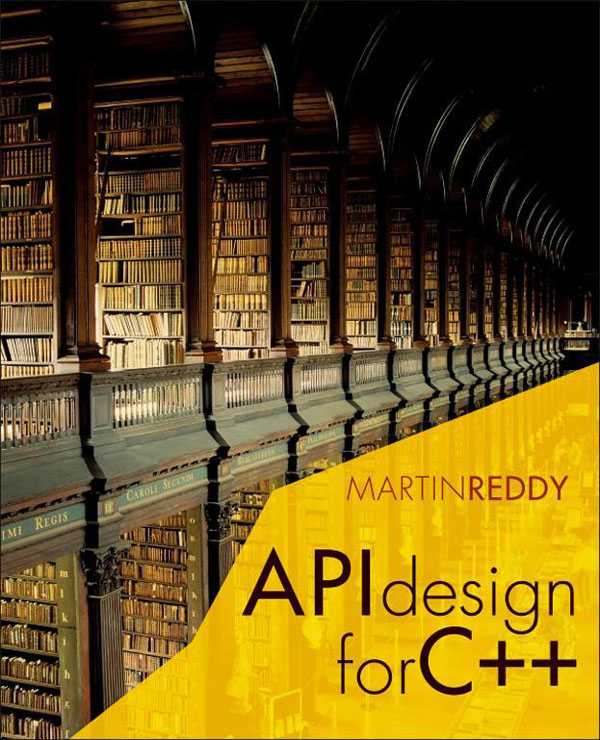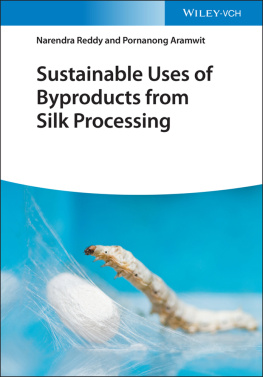Reddy - API Design for C++
Here you can read online Reddy - API Design for C++ full text of the book (entire story) in english for free. Download pdf and epub, get meaning, cover and reviews about this ebook. City: Burlington, Mass, year: 2011, publisher: Morgan Kaufmann;Elsevier Science, genre: Computer. Description of the work, (preface) as well as reviews are available. Best literature library LitArk.com created for fans of good reading and offers a wide selection of genres:
Romance novel
Science fiction
Adventure
Detective
Science
History
Home and family
Prose
Art
Politics
Computer
Non-fiction
Religion
Business
Children
Humor
Choose a favorite category and find really read worthwhile books. Enjoy immersion in the world of imagination, feel the emotions of the characters or learn something new for yourself, make an fascinating discovery.

API Design for C++: summary, description and annotation
We offer to read an annotation, description, summary or preface (depends on what the author of the book "API Design for C++" wrote himself). If you haven't found the necessary information about the book — write in the comments, we will try to find it.
Reddy: author's other books
Who wrote API Design for C++? Find out the surname, the name of the author of the book and a list of all author's works by series.
API Design for C++ — read online for free the complete book (whole text) full work
Below is the text of the book, divided by pages. System saving the place of the last page read, allows you to conveniently read the book "API Design for C++" online for free, without having to search again every time where you left off. Put a bookmark, and you can go to the page where you finished reading at any time.
Font size:
Interval:
Bookmark:

Martin Reddy

Acquiring Editor: Todd Green
Editorial Assistant: Robyn Day
Project Manager: Andr Cuello
Designer: Eric DeCicco
Morgan Kaufmann is an imprint of Elsevier
30 Corporate Drive, Suite 400, Burlington, MA 01803, USA
2011 Elsevier, Inc. All rights reserved.
No part of this publication may be reproduced or transmitted in any form or by any means, electronic or mechanical, including photocopying, recording, or any information storage and retrieval system, without permission in writing from the publisher. Details on how to seek permission, further information about the Publishers permissions policies and our arrangements with organizations such as the Copyright Clearance Center and the Copyright Licensing Agency, can be found at our website: www.elsevier.com/permissions.
This book and the individual contributions contained in it are protected under copyright by the Publisher (other than as may be noted herein).
Notices
Knowledge and best practice in this field are constantly changing. As new research and experience broaden our understanding, changes in research methods or professional practices may become necessary. Practitioners and researchers must always rely on their own experience and knowledge in evaluating and using any information or methods described herein. In using such information or methods they should be mindful of their own safety and the safety of others, including parties for whom they have a professional responsibility.
To the fullest extent of the law, neither the Publisher nor the authors, contributors, or editors, assume any liability for any injury and/or damage to persons or property as a matter of products liability, negligence or otherwise, or from any use or operation of any methods, products, instructions, or ideas contained in the material herein.
Library of Congress Cataloging-in-Publication Data
Application submitted
British Library Cataloguing-in-Publication Data
A catalogue record for this book is available from the British Library.
ISBN: 978-0-12-385003-4
Printed in the United States of America
12 13 14 10 9 8 7 6 5 4 3

For information on all MK publications visit our website at www.mkp.com
I should begin by confessing that I do not consider myself a world-class API designer or software engineer. I do, however, consider myself an expert researcher in the areas of computer graphics and geometric modeling. It was in this line of work that I first met Martin at Pixar Animation Studios.
As a graphics researcher I was accustomed to writing mathematically sophisticated papers. I was also formally trained as a computer scientist at a major university and had written my share of code. Armed with this background, when I was presented with the opportunity to lead a group of software engineers working on a new generation of animation software for Pixar, I figured that it couldnt be any more difficult than research. After all, research is, by definition, the creation of the unknown, whereas engineering is the implementation of well-understood subjects. I could not have been more wrong.
I came to realize that software engineering was, without a doubt, the most difficult challenge I had ever been presented with. After more years than I care to admit, I eventually gave up and went back to graphics research.
I cant tell you how much I would have benefitted from a book such as API Design for C++. Many of the lessons we learned the hard way have been captured by Martin in this insightful, easy-to-use book. Martin approaches the subject not from the perspective of an academic software researcher (although he draws heavily from results and insights gained there), but from the perspective of an in-the-trenches software engineer and manager. He has experienced firsthand the importance of good software design and has emerged as an articulate voice of what good means. In this book he presents effective strategies for achieving that goal.
I particularly like that Martin is not focusing just on API design, but more broadly on software life cycles, allowing him to cover topics such as versioning, strategies for backward compatibility, and branching methodologies.
In short, this book should be of great value to those creating or managing software activities. It is a comprehensive collection of best practices that have proven themselves time and time again.
Tony DeRose, Senior Scientist and Research Group Lead, Pixar Animation Studios
Writing large applications in C++ is a complex and tricky business. However, designing reusable C++ interfaces that are robust, stable, easy to use, and durable is even more difficult. The best way to succeed in this endeavor is to adhere to the tenets of good Application Programming Interface (API) design.
An API presents a logical interface to a software component and hides the internal details required to implement that component. It offers a high-level abstraction for a module and promotes code reuse by allowing multiple applications to share the same functionality.
Modern software development has become highly dependent on APIs, from low-level application frameworks to data format APIs and graphical user interface (GUI) frameworks. In fact, common software engineering terms such as modular development, code reuse, componentization, dynamic link library or DLL, software frameworks, distributed computing, and service-oriented architecture all imply the need for strong API design skills.
Some popular C and C++ APIs that you may already be aware of include the Standard Template Library (STL), Boost, the Microsoft Windows API (Win32), Microsoft Foundation Classes (MFC), libtiff, libpng, zlib, libxml++, OpenGL, MySQL++, Nokias Qt, wxWidgets, GTK++, KDE, SkypeKit, POSIX pthreads, Intels Threading Building Blocks, the Netscape Plugin API, and the Apache module API. In addition, many of Googles open-source projects are C++, as is much of the code on the sourceforge.net , bitbucket.org , and freshmeat.net Web sites.
APIs such as these are used in all facets of software development, from desktop applications, to mobile computing and embedded systems, to Web development. For example, the Mozilla Firefox Web browser is built on top of more than 80 dynamic libraries, each of which provides the implementation for one or more APIs.
Elegant and robust API design is therefore a critical aspect of contemporary software development. One important way in which this differs from standard application development is the far greater need for change management. As we all know, change is an inevitable factor in software development; new requirements, feature requests, and bug fixes cause software to evolve in ways that were never anticipated when it was first devised. However, changes to an API thats shared by hundreds of end-user applications can cause major upheaval and ultimately may cause clients to abandon an API. The primary goal of good API design is therefore to provide your clients with the functionality they need while also causing minimal impact to their codeideally zero impactwhen you release a new version.
Font size:
Interval:
Bookmark:
Similar books «API Design for C++»
Look at similar books to API Design for C++. We have selected literature similar in name and meaning in the hope of providing readers with more options to find new, interesting, not yet read works.
Discussion, reviews of the book API Design for C++ and just readers' own opinions. Leave your comments, write what you think about the work, its meaning or the main characters. Specify what exactly you liked and what you didn't like, and why you think so.












